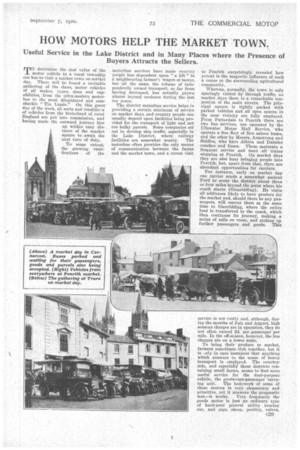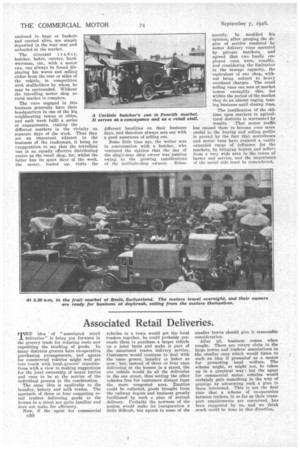HOW MOTORS HELP THE MARKET TOWN.
Page 51

Page 52

If you've noticed an error in this article please click here to report it so we can fix it.
Useful Service in the Lake District and in Many Places where the Presence of Buyers Attracts the Sellers.
MO determine the real value of the .L motor vehicle to a rural township one has to visit a market town on market day. There will be found a veritable gathering of the clans, motor vehicles of all makes, types, sizes and capabilities, from the ultra -modern motorbus to the most dilapidated and ramshackle "Tin Liz.zie." On this great day of the week, all sorts and conditio of vehicles from the hinterland of rural England are put into commission, and having made the outward journey line up within easy die-, tance of the market square to await the next turn of duty.
To some extent, the growing ramifications of the
motorbus services have made country people less dependent upon "a lift" in a neighbouring farmer's wagon or motor, but all the same, the volume of independently owned transport, so far from having decreased, has actually grown almost beyond credence during the last ten years.
The district motorbus service helps in providing a certain minimum of service on market days, and country people can usually depend upon facilities being provided for the transport of light and not too bulky parcels. Some companies set Out to develop this traffic, especially in the Lake District, where railway facilities are somewhat scanty. The motorbus often provides the only means of communication between the farms and the market town, and a recent visit to Penrith surprisingly revealed how potent is the magnetic influence of such a venue to the surrounding agricultural community.
Whereas, normally, the town is only sparingly visited by through traffic, oh market days there is a remarkable congestion of the main streets. The principal square is tightly packed with parked vehicles and all open spaces, in the near vicinity are fully employed. From Patterdale to Penrith there are two bus services, one operated by the Tillswater Motor Mail Service, who operate a fine fleet of Reo saloon buses, and the other-by Messrs. Armstrong and Siddles, who have Albion and Daimler coaches and buses. These maintain a frequent service and meet all trains stopping at Penrith. On market days they are also busy bringing people into Penrith, but, apart from that, there are abundant opportunities for carriers.
For instance, early on market day one carrier sends a somewhat ancient Ford to scour the district about three or four miles beyond the point where his coed/ starts (Glenridding). He visits all addresses likely to have produce for the market and, should there be any passengers, will convey them at the same time to Glenridding, where the entire load is transferred to the coach, which then continues its journey, making a series of calls en route, and picking up further passengers and goods. This
service is not costly and, although, during the months of July and August, high seasons charges are in operation, they do not often exceed 2d. per -passenger per mile. In the off-season, however, the bus charges are on a lower scale.
To bring their produce to market, farmers sometimes club together, but it is only in rare instances that anything which answers to the name of heavy transport is employed. The countryside, and especially those districts containing small farms, seems to find more useful service for the dual-purpose vehicle, the goods-cum-passenger -carrying unit. The bodywork of some of these motors is very elementary and primitive, yet it answers the pragmatic
test—it works. Very frequently the goods motor is just an ordinary type of hard-used general utility touring car, and pigs, sheep, poultry, calves, enclosed in bags or baskets and carried alive, are simply deposited in the rear seat and unloaded at the market.
The itinerant trade r, butcher, baker, caterer, hardwareman, etc., with a motor van, can always be found displaying his wares and selling either from the rear or sides of the vehicle, in competition with stallholders by whom he may be surrounded. Without the travelling motor shop no rural market is complete.
The vans engaged in this business generally have their headquarters in one of the big neighbouring towns or cities, and each week fulfil a series of engagements, visiting the different markets in the vicinity on separate days of the week. Thus they are an important adjunct to the business of the tradesman, it being no exaggeration to say that the travelling van is an equally effective distributing centre as the retail shop, for, whilst the latter has its quiet days of the week, the motor, loaded up, visits the different localities on their business days, and therefore always sets out with a good assurance of selling out.
Some little time ago, the writer was in conversation with a butcher, who ventured the opinion that the day c•f the singe-man shop owner was passing owing to the growing ramifications of the multiple-shop owners. Subse quently, he modified his opinion, after gauging the degree of service rendered by motor delivery vans operated by private butchers, and agreed that two busily employed vans were, roughly, and considering the limitation in the storage capacity, the equivalent of one shop, without being subject to . heavy overhead charges. The retail selling vans one sees at market towns exemplify this, for within the period of the market they do an almost raging, tearing business until closing time.
The justification of the oldtime open maikets in agricultural districts is warranted by results. That motor traffic has caused them to become even more useful to the buying and selling public is proved by the fact that motorbuses and motor vans have ensured a. vastly extended range of influence for the markets, by bringing buyers and selleri from a very wide area to the venue of barter and service, and the importance of the social side must be remembered.












































































































